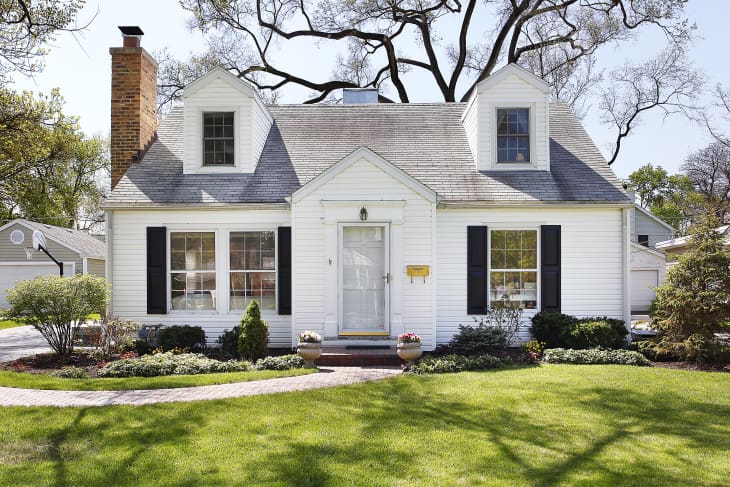Here’s What to Do If Someone Asks to Buy Your House (And You’re Not Selling)

Last fall, my phone lit up with an unexpected text from a neighbor. “Hey, do you happen to know anyone on our street who would sell their house? My sister really wants to move into the neighborhood.” As fate would have it, we’d actually been entertaining the idea of listing our home in the near future. Plus, we were interested in passing on our home to someone we “knew.” We had a discussion with our neighbor’s sister, and she ultimately decided to make a compelling offer. (We accepted.)
As the market continues to heat up, affordable and desirable homes are few and far between — which means it’s becoming more and more common for people to receive unsolicited offers just like we did. For us, the decision was a no-brainer. But what if we weren’t already entertaining the idea of listing our house?
Scott Campbell, an associate with RE/MAX United in Cedarburg, Wisconsin, says it can be advantageous to sell, even if you weren’t necessarily planning on it. It ultimately comes down to a few factors — if you’re willing to relocate and how compelling the offer is. “The money and the terms offered might be just the turning point for someone to consider selling even if they weren’t originally planning to,” Campbell says.
That said, he recommends potential sellers proceed with caution. Here’s what to know about how to handle an offer on your off-market home.
What To Do If You Receive an Offer from a Developer or Investor
Not all offers come from individuals who want to move closer to a family member — some stem from house flippers who want to sell homes for more money or developers with plans to tear down your home and replace it with a high-rise.
James McGrath, founder of the New York City-based real-estate brokerage Yoreevo says sellers often receive offers well below market value — cash investors typically bid that way in hopes sellers need cash or are just unaware of how much the home is actually worth. If you’re interested in an offer, it’s best to get a professional opinion on the value of the home before moving forward. “You could get that information from an appraiser, real estate agent or, while certainly not ideal, even Zillow would be better than nothing,” McGrath says.
In the case of a developer, ask questions about the details and scope of the potential development. “Remember you don’t have to sell, but if you don’t and new commercial buildings are to be planned around you, they will build around you,” says Campbell.
Another risk: Holding out for more can backfire if you don’t sell right away. You may get less money if the property decreases in value as you wait things out. “For example, if you have a narrow parcel of property wedged between two strip malls, your property value will likely have gone way down or be worth nothing as they can no longer build a business on your property,” Campbell says.
Not interested in selling? Be direct but polite, and let the individual or developer know you aren’t interested. Don’t be surprised if they follow up, though, even with a formal offer to purchase.
What to Do If You Receive an Offer from an Individual
If a regular homeowner knocks on your door or sends a letter, you can expect that person to be very focused on a particular neighborhood — so much so that they went out of their way to contact someone who wasn’t planning on selling. In many cases, McGrath says, individual buyers will be motivated to pay top dollar.
If you receive an offer you can’t refuse, it’s still worth doing your due diligence to make sure you’re getting a fair amount for your home (and the hassle of moving before you planned to). If moving is off the table, be direct and polite — unlike developers, individuals should get the picture that you’re not interested.
What to Do If You Decide to Sell
Should you decide to move forward with selling your home, you can avoid pricey real estate agent fees with a private sale. But even if you choose that route, make sure you have professional support. Campbell suggests consulting with a real estate agent or attorney so you don’t miss any crucial details.
“While it may sound counter-intuitive, you can hire a real estate agent to manage the sale on your behalf and still avoid some of the commissions you would have paid had you engaged a Realtor initially to actively market your home,” says Mark Washburn, a Realtor with Naples Condo Boutique. “You should also consider working with a real estate lawyer who can help with the complexities of any sale and can also draw up the purchase contract and even help with negotiating terms.” If you’re providing a counteroffer, for example, presenting your counter on an attorney’s letterhead signifies you are serious about the sales process.
While saving a bit of money on real estate agent commission was tempting, my husband and I simply didn’t have the capacity to figure out all those details on our own — so we decided to involve a real estate agent. For us, losing a bit of money was worth avoiding a future headache. I’m grateful to say we haven’t had any regrets since!